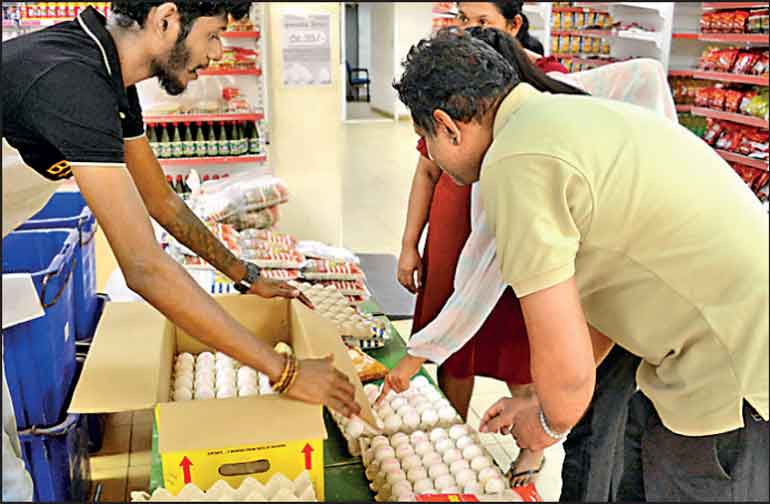Sunday Feb 22, 2026
Sunday Feb 22, 2026
Thursday, 27 July 2023 00:30 - - {{hitsCtrl.values.hits}}

People buying imported eggs at Sathosa in Colombo yesterday. Imported eggs are now sold at Rs.35 each and packed eggs at Rs.40 each following the removal of the MRP imposed by the Consumer Affairs Authority on Tuesday –Pic by Pradeep Pathirana
By Charumini
de Silva
Producers and consumers alike are optimistic about the potential decrease in egg prices below Rs. 50 allowing the market to find a balance based on supply and demand dynamics, following the removal of the Maximum Retail Price (MRP).
As the industry gears up for the upcoming week, stakeholders eagerly await the anticipated price adjustment, providing some relief to consumers and an opportunity for producers to stabilise their operations.
“The supply network had suffered disruptions due to the introduction of control prices earlier this year. We welcome the Government’s decision to remove the MRP and allow the equilibrium of supply and demand should dictate prices,” All-Island Poultry Farmers’ Association Chairman Ajith Gunasekara told the Daily FT.
He emphasised that the recent removal of the MRP for eggs is expected to enhance supplies, which, in turn, will lead to a reduction in prices.
The association assured that by December, the industry can achieve self-sufficiency, leading to prices dropping below Rs. 35, but called on the Government to gradually reduce egg imports from India as the local producers’ eggs will release higher output to the market in the coming months.
The Consumer Affairs Authority (CAA) published an Extraordinary Gazette yesterday, revoking the order that had set the MRP for eggs in April. The Gazette, issued under the powers vested by Section 20(5) of the Consumer Affairs Authority Act, No. 9 of 2003 (Amended), was signed by CAA Chairman Shantha Niriella.
Amidst the economic crisis and rising production costs, six out of twelve companies that used to import parent stock from Germany and France have left the industry, citing uncertainty. This in turn resulted in a short supply of eggs to the local market and created a black market.
To resolve the shortage in the market, the Government then decided to import eggs from India to be distributed for commercial purposes. However, the consumers complained that the move was not successful until the Government allowed State-run Sathosa to sell eggs from Tuesday at Rs. 35 per egg and removed the MRP.
“One of the main cost-related challenges faced by farmers was the inability to secure sufficient stocks of corn, which accounts for 80% of their nutrients. After much deliberation, our association and the Agriculture Ministry have jointly requested the Treasury to allow them to import corn. This move will hopefully reduce production costs and improve the industry’s competitiveness,” Gunasekara added.
Sri Lanka produces around 3,000 million per year but it has reduced to 2,000 eggs per year following the crisis. Eggs are considered the most affordable and protein-rich diet, making their accessibility crucial for the general public.
Gunasekara highlighted that Indian eggs are cheaper due to their farmers having easy access to all necessary raw materials within their country, whilst Sri Lankan egg farmers have to import them. “Our aim is to safeguard the local farming community and provide consumers with high-quality, fresh, and nutrient-rich products,” he added.